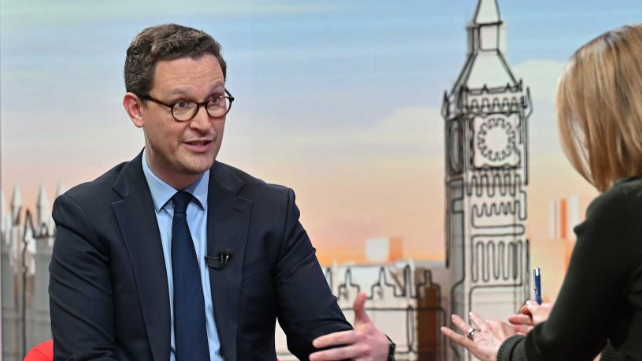Globalisation era has ended, says Treasury minister
Watch: Treasury minister "disappointed" but won't say if he believes government can reduce tariffs
- Published
Chief Secretary to the Treasury Darren Jones said the era of globalisation has "ended" following Donald Trump's new tariffs.
It comes after Prime Minister Sir Keir Starmer suggested in a Sunday Telegraph article he was about to announce state intervention to protect UK firms from the US president's move.
The UK was among nations hit with a 10% "baseline" import duty, and negotiations on a trade deal to reduce tariffs are continuing.
Conservative leader Kemi Badenoch disagreed that globalisation was over and pointed to "great" trading relationships with other countries.
Some analysts fear a global recession following Trump's so-called Liberation Day, when he announced sweeping import taxes, sparking retaliatory action from countries including China and Canada.
The prime minister has said the government "will do everything necessary to protect Britain's national interest" and is "ready to use industrial policy" to help shelter businesses, because "the world as we know it has gone".
Speaking to the BBC's Sunday with Laura Kuenssberg programme, Jones was asked whether globalisation - which has resulted in a boom in imports of cheap fashion, electrical goods and other products - was over.
"Yeah it's ended, the prime minister said that himself this morning," he said.
"Globalisation as we've known it for the last couple of decades has come to an end."
The change meant the UK had to "build out" relationships with allies around the world but also invest in the UK's own economy, Jones said, denying ministers were "scrabbling" for solutions.
He insisted the government was "trying to get ahead of these challenges", and that was why the government is "investing in the NHS and skills as well as industrial policy".
Amid reports that elements of the spending review and the industrial strategy could be brought forward from their expected June publication date, Jones said Labour had been working on the industrial strategy since it was in opposition.
Pressed on whether measures would be brought forward, Jones deferred to Sir Keir's announcement expected in the coming days and laughed when Kuenssberg said "that sounds almost like a yes, but you're not allowed to say it to us this morning".
The UK government has continued its policy of not responding to US tariffs with counter-tariffs, as other countries have done - preferring, ministers have said, a "calm" approach focused on a UK-US trade deal.
"We're hoping to do a deal," Jones said, adding that "we have a better outcome than other comparable countries as a consequence of our diplomacy" on tariffs.

The Liberal Democrats have called for MPs to be allowed to vote on any deal struck with Trump due to concerns about the possibility of changes to regulations around farming, online content and the digital services tax on US social media giants.
The party's deputy leader Daisy Cooper said it would be "deeply undemocratic" to sideline Parliament on these "critical" issues.
She said: "Both Conservative and Labour MPs should commit now to voting down any Trump deal that sells out British farmers and their high food standards or waters down our online safety rules."
Asked to rule out watering down the Online Safety Act, Labour's Jones said protections for children are "non-negotiable" and committed to ensuring that social media platforms are "designed in a way that protects children from harm".
Environment Secretary Steve Reed has previously said "we won't undercut British farmers on welfare or environmental standards" in order to secure a US trade deal.
However, earlier this month, Chancellor Rachel Reeves suggested the UK could change its taxes on big tech firms as part of a deal to overturn US tariffs, despite the digital services tax bringing in about £800m per year since its introduction in 2020.
Speaking on the Kuenssberg programme, Conservative leader Kemi Badenoch agreed that retaliatory tariffs were not a solution because they would only harm UK consumers.
However, she said she did not agree that globalisation was over, insisting what was happening was only "fragmentation", adding "we still have a great trading relationship with many other countries".
Badenoch added the Labour government should pick up the deal former Prime Minister Boris Johnson had tried to negotiate with Trump during his previous presidency, which ended in 2020.
Johnson and his successor Liz Truss tried to push Trump's predecessor Joe Biden to open trade talks but negotiations petered out without a deal being struck.
Rishi Sunak managed to agree the Atlantic Declaration with Biden, including commitments on easing trade barriers, closer defence industry ties, a data protection deal and more co-operation on AI.
Asked whether a UK-US trade deal was indeed "oven-ready", as Badenoch has previously claimed several times, the Tory leader suggested the government should "pick up where we left off".
She continued: "We had six rounds of negotiations where there were some decisions that were concluded and they can pick that up and take it.
"The most important thing is removing tariffs - the tariffs are going to be disruptive for our businesses... That is going to make a whole mess of the tax take that [Chancellor] Rachel Reeves thought she was going to be getting in her budget.
"We are in a worse place now because of the decisions that Labour has made and people out there are suffering."

Sign up for our Politics Essential newsletter to read top political analysis, gain insight from across the UK and stay up to speed with the big moments. It'll be delivered straight to your inbox every weekday.